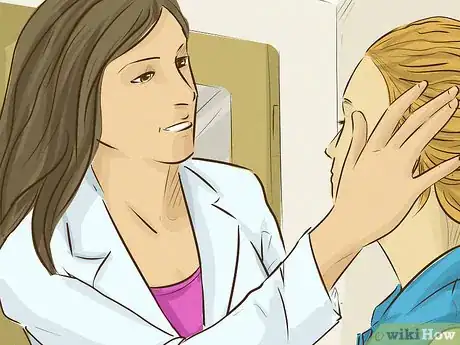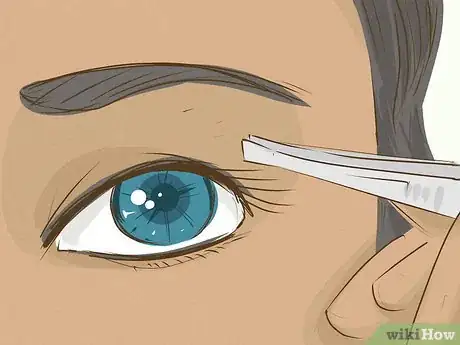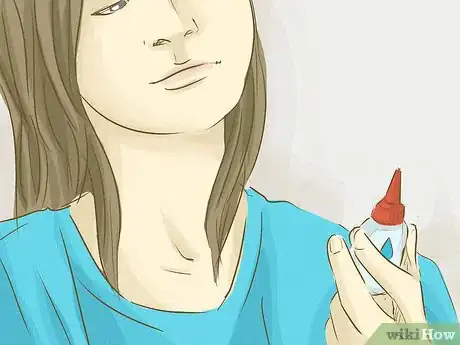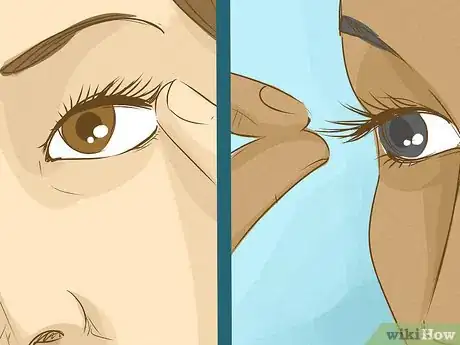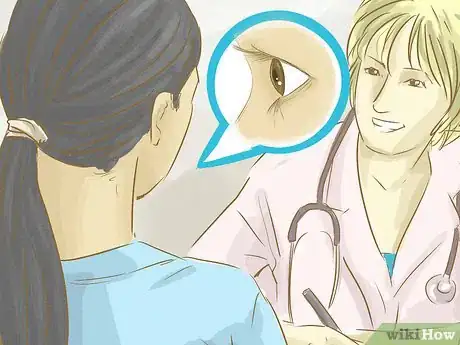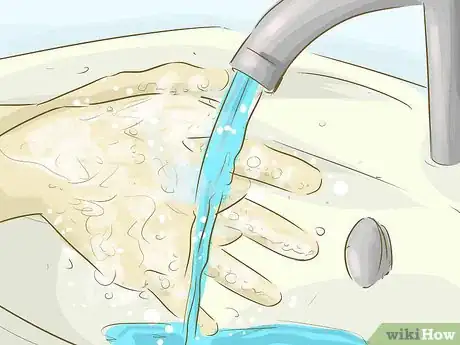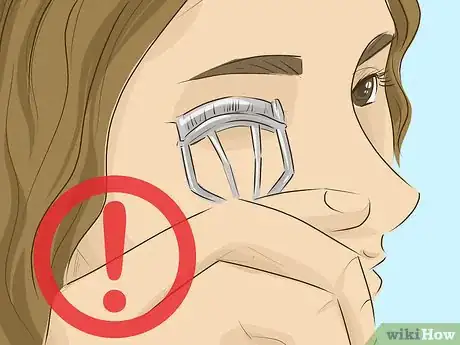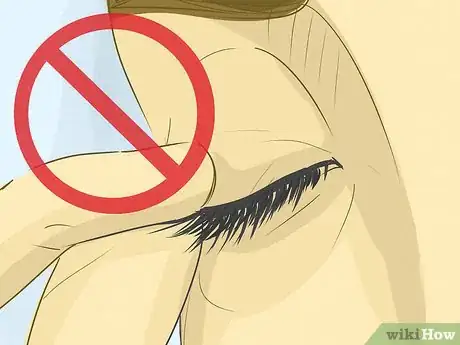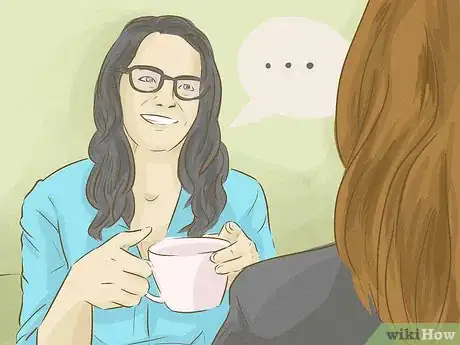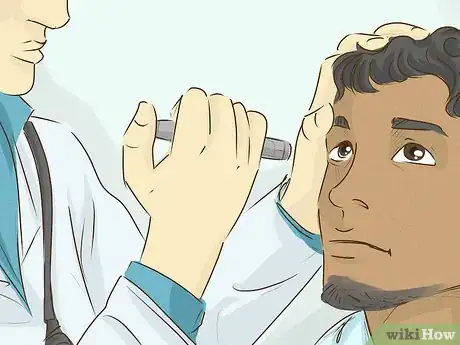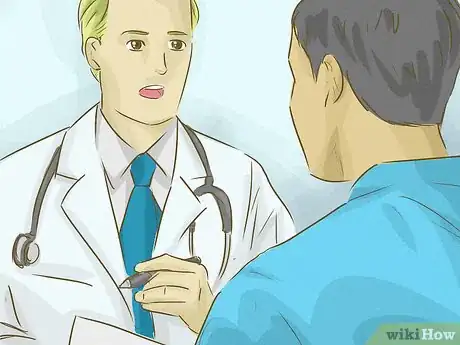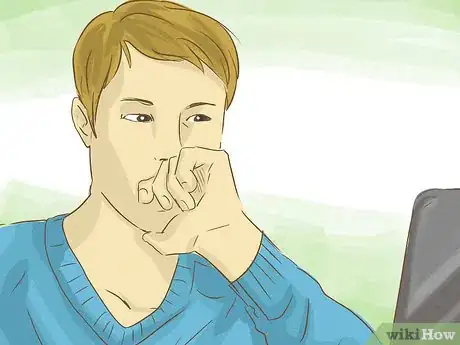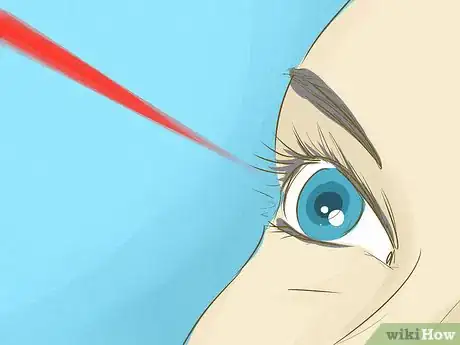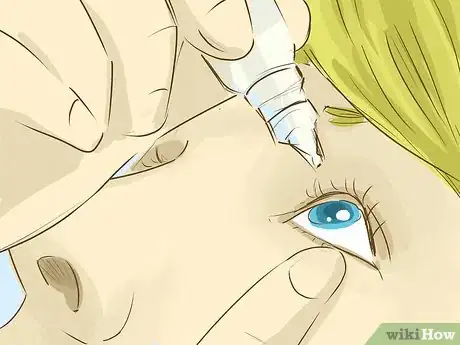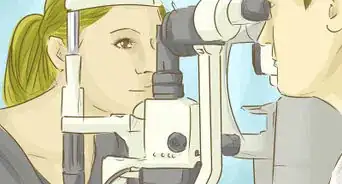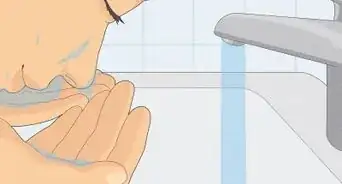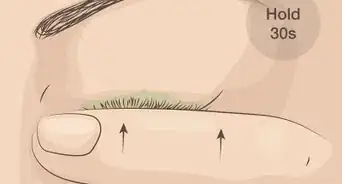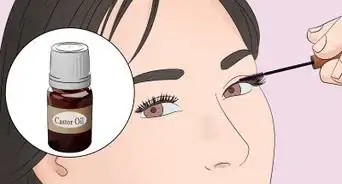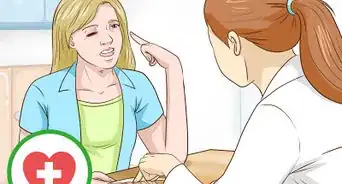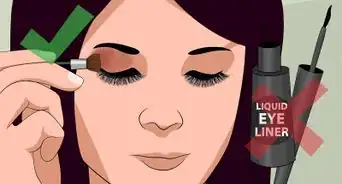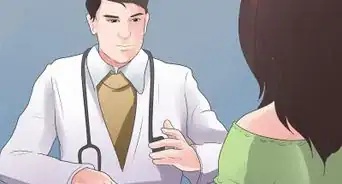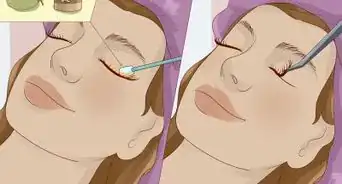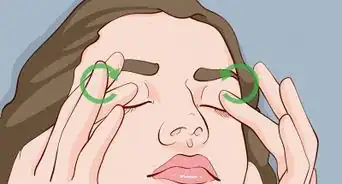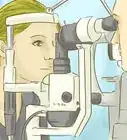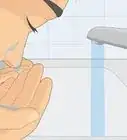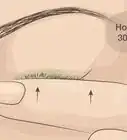This article was co-authored by Hannah Metz. Hannah Metz is a Professional Makeup & Hair Artist and the Founder and CEO of Hannah Elisabeth Beauty. With ten years of experience, she specializes in providing luxury makeup artistry and hair styling on location for others. Hannah and her team have completed beauty work for brand campaigns, celebrity red carpet events, and social media influencers.
There are 8 references cited in this article, which can be found at the bottom of the page.
This article has been viewed 114,996 times.
Eyelashes frame your eyes beautifully and keep harmful particles out of your eyes. But what about when your eyelashes are irritating your eye? When your eyelashes grow towards your eyeball instead of away from it, it is called trichiasis. This poking can irritate your eye and cause serious damage over time. By treating stray eyelashes, resolving chronic eyelash poking, and preventing eyelashes from poking your eye, you can keep your eyes healthy.[1]
Steps
Treating Stray Eyelashes
-
1Visit your ophthalmologist. Your ophthalmologist will perform an eye exam to get a better look at the troublesome eyelashes. They will also be able to perform tests to check for any scratching of the outer layer of your eye, the cornea. Tell the doctor how long the eyelash problem has been going on and any other symptoms you’ve been having, if applicable.[2]
-
2Have the problem eyelashes removed with forceps. For any individual lashes that are scratching your eye with no other apparent problems, your doctor will use a pair of forceps to pluck out the lashes that are hurting you. Do your best to relax and hold still during the procedure. It can help to take a few deep breaths.[3]
- Because your eyes are so sensitive and important, it’s really best to have any problem eyelashes removed by the doctor rather than trying to tweeze them yourself at home. You could accidentally scratch your eyes and damage your sight.
Advertisement -
3Follow the doctor’s directions for aftercare. Depending upon any corneal scratching or other issues that were discovered during the exam, your doctor may prescribe you antibiotic eye drops after removing the problem lashes. Follow the doctor’s instructions, especially about scheduling any follow up appointments. There may be no special directions or healing at all, if your problem was mild.[4]
-
4Look for any recurrences of the problem. While some eyelashes that poke your eye are flukes and grow back in properly, others will grow back towards the eye again. Keep an eye out for any lashes that grow in the wrong way. You will need to have them addressed in a more permanent way so they are not a constant irritant.[5]
-
5Visit your ophthalmologist to have recurrences addressed. Repeated scratching of your eye by your eyelashes can cause serious damage. There are treatments to remove problem eyelashes permanently so your eyes remain healthy with clear sight.[6]
Preventing Eyelashes from Poking Your Eye
-
1
-
2Brush your eyelashes each day. Use a clean, disposable lash spoolie to comb through your lashes when you wake up and after you shower or bathe. This will help direct extra-long lashes into place so they won't poke you in the eye.[9]
-
3Minimize your use of eyelash curlers. If you clamp your eyelashes into an eyelash curler improperly, it is easy to curl your eyelashes the wrong way towards the eye. If you have problems with your eyelashes growing the wrong way already, it’s probably best to avoid devices like this, as they can worsen the problem.
-
4Clean your makeup brushes regularly. Avoid sharing mascara, and clean your makeup brushes with mild soap and water at least once a week. The brushes can air dry. Dirty brushes can cause eye infections, which may make your eyelashes grow towards the eye rather than away from it.
- Remove your makeup completely using soap and water or a makeup cleaning cloth before going to bed each night.
-
5Avoid false lashes. False eyelashes are typically adhered to your eyelid with tacky glues. Many glues contain formaldehyde and can cause allergic reactions and atypical lash growth due to the weight and stickiness of the glue. If you have trouble with your lashes growing in improperly, take a break from false lashes for a while.[10]
-
6Ask your family about their eye health history. Sometimes, trichiasis can be hereditary. Knowing more about your family’s eye history can alert you to any chronic problems that may be contributing to your eyelash poking. Talk to your doctor about any family patterns that may be relevant to your treatment.[11]
Resolving Chronic Eyelash Poking
-
1Have an ophthalmologist assess the severity of your problem. Depending upon whether your issue is related to a few eyelashes or many, your doctor may choose different courses of treatment. Your doctor will perform an eye exam and get a history of your issue to best understand what has been going on.[12]
-
2Discuss any anatomical abnormalities. Certain anatomical abnormalities and conditions, such as epiblepharon and entropion, can cause eyelashes that are growing normally to touch the eye. This is less a problem with the eyelashes themselves than with the eyelid. Your ophthalmologist can determine whether your anatomy or your eyelash growth is causing your persistent issue.[13]
- Anatomical abnormalities can often be resolved through surgery. Your doctor will determine what the proper course of action is for you.
- If your anatomy is normal and you have multiple lashes growing towards your eye, your ophthalmologist may recommend treatments to have them permanently removed.
-
3Determine whether electrolysis or cryosurgery is right for you. The two main courses of treatment for chronic eyelash poking are electrolysis, which uses electricity to permanently remove the eyelashes, or cryosurgery, which freezes and removes the problem lashes and their follicles. Both of these treatments are done in an outpatient setting where your eye is numbed, so you will not feel much pain.[14]
- Each of these procedures has its own risks and benefits. Discuss them with your doctor to determine which makes the most sense for you.
-
4Go in for your procedure. The morning of your procedure, follow any directions the doctor has given you about eye care. Come in rested, if possible. If you feel nervous, take a few deep breaths or listen to your favorite music to relax. The procedures are short, and your problem will be resolved shortly.
- It can help to bring a friend or family member for support on the day of the procedure if you’d like some reassurance.
-
5Follow any aftercare instructions from the ophthalmologist. Depending upon your case, you may need to use eye drops or antibiotic cream while your lash follicles heal. Perform aftercare as directed, and schedule any follow up visits so the doctor can track your healing.
- During healing, call your doctor if you notice any signs of infection, such as redness, yellow or green discharge, skin that is warm to the touch or a fever.[15]
Expert Q&A
-
QuestionDo eyelashes grow back if pulled from the root?
 Laura MartinLaura Martin is a Licensed Cosmetologist in Georgia. She has been a hair stylist since 2007 and a cosmetology teacher since 2013.
Laura MartinLaura Martin is a Licensed Cosmetologist in Georgia. She has been a hair stylist since 2007 and a cosmetology teacher since 2013.
Licensed Cosmetologist Yes, unless the follicle is damaged, but it can take a long time. Avoid pulling them out whenever possible.
Yes, unless the follicle is damaged, but it can take a long time. Avoid pulling them out whenever possible. -
QuestionHow do you get eyelashes out of your eyes?
 Laura MartinLaura Martin is a Licensed Cosmetologist in Georgia. She has been a hair stylist since 2007 and a cosmetology teacher since 2013.
Laura MartinLaura Martin is a Licensed Cosmetologist in Georgia. She has been a hair stylist since 2007 and a cosmetology teacher since 2013.
Licensed Cosmetologist If your lashes are growing toward your eyes, you can use an eyelash curler to gently redirect them. If an eyelash comes loose and falls in your eye, flush with water to rinse out.
If your lashes are growing toward your eyes, you can use an eyelash curler to gently redirect them. If an eyelash comes loose and falls in your eye, flush with water to rinse out. -
QuestionDo you need your eyelashes to see?
 Laura MartinLaura Martin is a Licensed Cosmetologist in Georgia. She has been a hair stylist since 2007 and a cosmetology teacher since 2013.
Laura MartinLaura Martin is a Licensed Cosmetologist in Georgia. She has been a hair stylist since 2007 and a cosmetology teacher since 2013.
Licensed Cosmetologist No, but they do keep dirt and debris out of your eyes. Without them, your eyes would get scratched and dry.
No, but they do keep dirt and debris out of your eyes. Without them, your eyes would get scratched and dry.
References
- ↑ http://www.webmd.com/eye-health/trichiasis-eyelashes-eyes
- ↑ https://www.aao.org/eye-health/diseases/trichiasis-treatment-details
- ↑ https://www.aao.org/eye-health/diseases/trichiasis-treatment-details
- ↑ https://www.skinsight.com/skin-conditions/adult/corneal-abrasion
- ↑ https://www.aao.org/eye-health/diseases/trichiasis-treatment-details
- ↑ https://www.aao.org/eye-health/diseases/trichiasis-treatment-details
- ↑ http://www.webmd.com/eye-health/trichiasis-eyelashes-eyes
- ↑ https://nei.nih.gov/healthyeyes/eyehealthtips
- ↑ Hannah Metz. Professional Makeup & Hair Artist. Expert Interview. 14 December 2021.
- ↑ http://www.consumerreports.org/cro/2013/05/eyelash-extensions-can-pose-health-risks/index.htm
- ↑ https://nei.nih.gov/healthyeyes/eyehealthtips
- ↑ https://www.aao.org/eye-health/diseases/trichiasis-treatment-details
- ↑ https://www.aao.org/eye-health/diseases/trichiasis-treatment-details
- ↑ https://www.aao.org/eye-health/diseases/trichiasis-treatment-details
- ↑ http://www.webmd.com/a-to-z-guides/tc/incision-care-after-surgery-topic-overview#1
About This Article
If your eyelashes are growing into your eyes, you’ll need to see an eye doctor. If you only have individual hairs growing into your eyes, they can pluck them out. It’s important to get an eye doctor to do this so you don’t risk scratching your eyes. If eyelashes growing into your eyes is a persistent issue, the doctor can perform procedures to remove the lashes permanently. To prevent random eyelashes from poking your eyes, avoid using eyelash curlers and false eyelashes if you already use them. If you wear makeup, clean your brushes regularly, since bacteria on them can cause an infection that makes your hairs grow towards your eyes. If you wear contact lenses, always wash your hands before touching them for the same reason. For more tips from our Beauty co-author, including how to decide if electrolysis or cryosurgery is right for you, read on.
